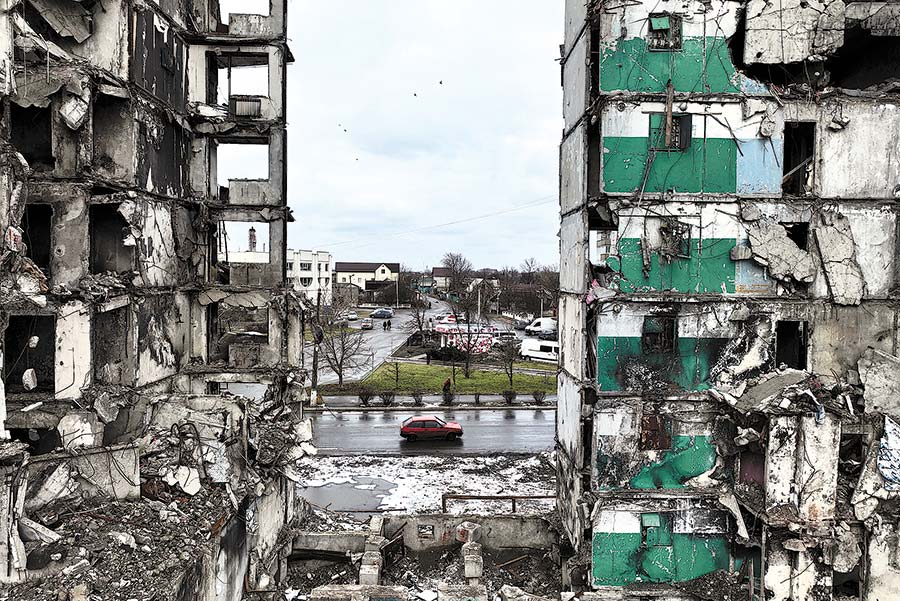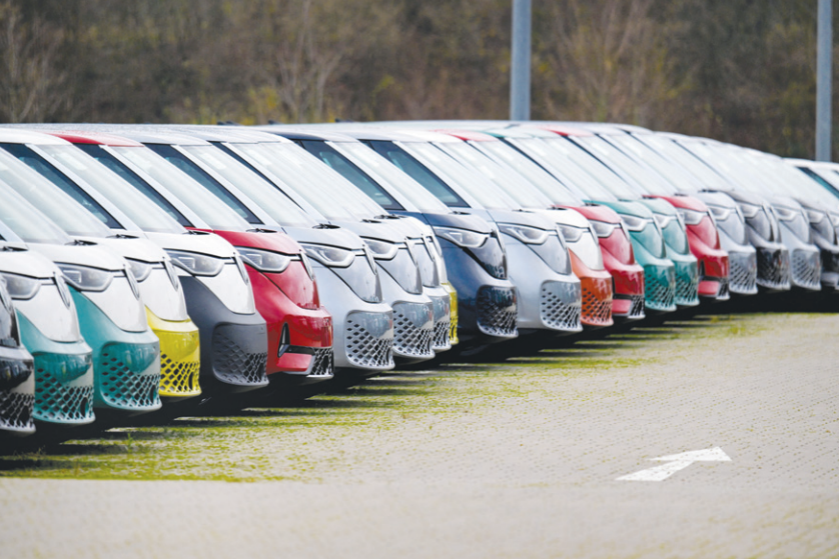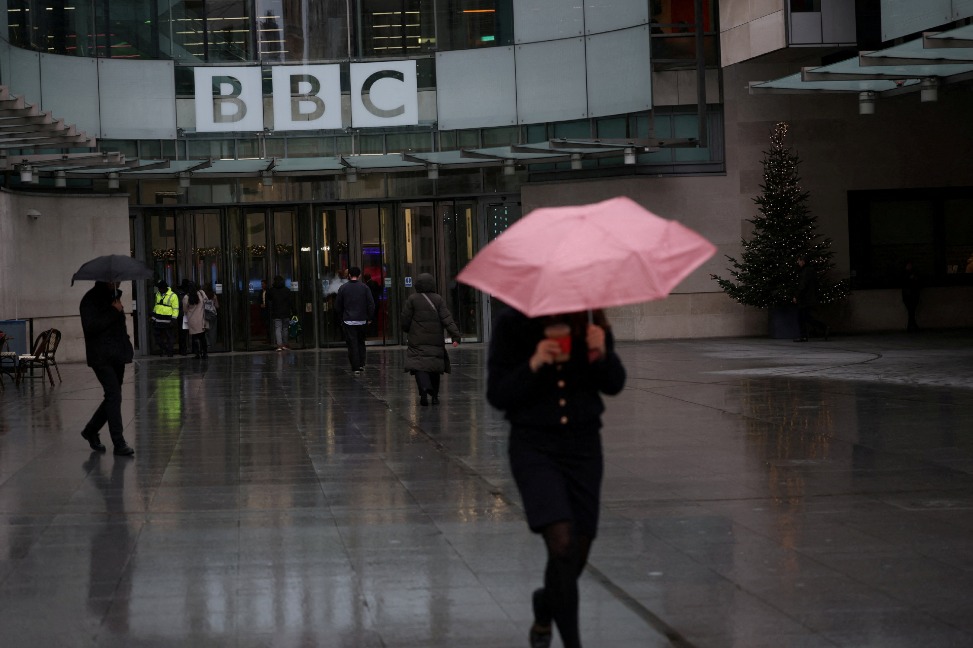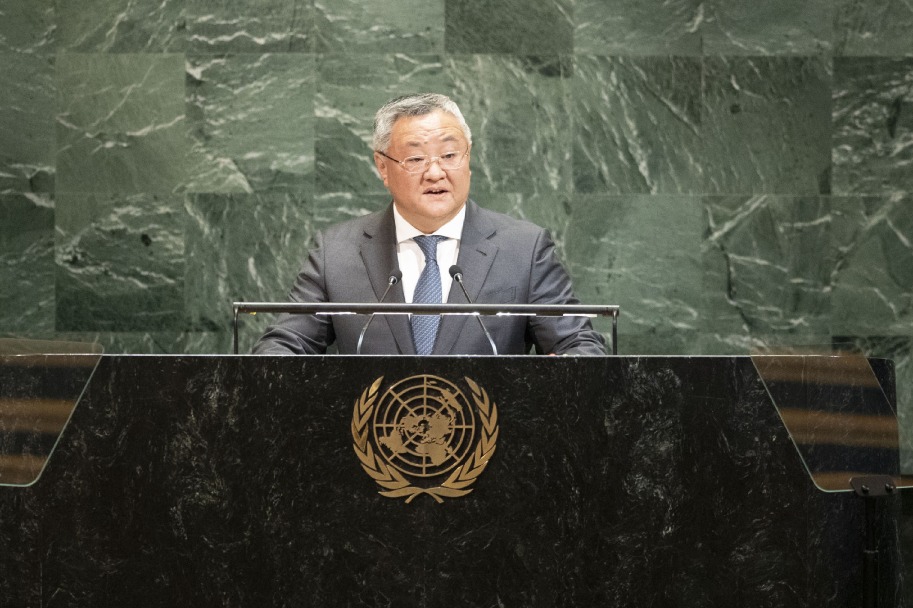Caught up in conflict yet again, Europe weighs its future

The Russia-Ukraine crisis has presented EU decision-makers with a pile of policy challenges

The Ukrainian flag of two horizontal bands, yellow over blue, has appeared in many corners of European cities over the past year, including being illuminated on the facade of the Berlaymont building that houses the European Commission in Brussels, to demonstrate support for Kyiv in the Russia-Ukraine conflict.
The conflict, which began a year ago, and for which no end is in sight, has resulted in tremendous changes in the security, political and economic landscape of the European Union and its 27 member states, experts say.
Ding Chun, director of the Center for European Studies at Fudan University in Shanghai, said: "The conflict has broken the peace, tranquillity and security structure in the EU and dealt a blow to its economic growth and social stability, spoiling its pandemic recovery efforts.
"The EU and its member states, which overall support Ukraine and are against Russia, have been engaged in an unprecedented seesaw battle of sanctions and counter-sanctions with Russia, plunging the EU into a situation of killing 1,000 of its enemies but losing 800 of its own soldiers," Ding said, citing a Chinese idiom.
The European Commission has urged member states to endorse its proposed 10th round of sanctions against Russia by Friday, but some are raising questions about what the sanctions, which were supposed to be crippling, have achieved.
The Russian economy shrank a modest 2.2 percent last year, the International Monetary Fund says, in sharp contrast to the 10-15 percent fall that Western financial houses had predicted. The IMF also forecast Russian economic growth of 0.3 percent this year and 2.1 percent next year.
Germany, the largest EU economy, is forecast to grow only 0.1 percent this year and 1.4 percent next year, and the 20-member eurozone by 0.7 percent this year and 1.6 percent next year.
In the EU, high energy prices are biting hard. An analysis by the think tank Bruegel in Brussels says EU states have earmarked or allocated 681 billion euros ($726 billion) to help households and companies tackle the energy crisis.
While the EU reduced its imports of Russian energy, the United States has ramped up its fossil fuel sales to the bloc and will become its largest energy supplier this year.
Last year the US exported nearly 10 million cubic meters of LNG to the EU a month, 137 percent more than in 2021, providing about half of all of Europe's imported LNG.
France's Finance Minister Bruno Le Maire and Germany's Economy Minister Robert Habeck have both accused the US of profiting from the Ukraine conflict and energy crisis and making Europe dependent on its LNG.
Qin Yan, a carbon analyst in Oslo with the financial data provider Refinitiv, said the US, as a major energy exporter, has no doubt secured large windfall profits as a result of rising European demand for non-Russian fossil fuels.
The EU energy crisis is far from over despite the recent drop in gas prices and a relatively mild winter, she said. "With the global gas market already being tight and the economic recovery boosting energy demand, European countries need to bid higher for LNG prices to attract deliveries."
Washington has also benefited from increasing its arms sales last year as European countries rushed to buy US weapons because of the conflict.
Early last month the US State Department said US weapons sales to Europe rose by 49 percent last year from $34.8 billion in 2021.
Germany was one of the biggest US arms buyers in Europe, ordering 35 F-35 fighter jets and munitions and equipment worth $8.4 billion in July.
The conflict has prompted the EU to break its taboo of not providing arms to countries involved in military conflict and has prompted many member states to increase their defense budgets, Ding said.
"For quite a while the EU will give priority to hard military power, geopolitics and security over what it prided itself earlier: globalization and the green and digital revolution," Ding said.
EU autonomy setback
The conflict has resulted in a warming of trans-Atlantic relations, a dramatic revival of NATO and a setback for the EU's strategic autonomy, he said, referring to a concept pushed by France's President Emmanuel Macron since 2017.
Macron has described NATO as "brain dead", but last year Finland and Sweden submitted applications to join the alliance.
Roderick Parkes, research director of the German Council of Foreign Relations, wrote in a paper last month that the Ukraine conflict has accelerated a 15-year trend in Europe that has pushed political authority away from a Franco-German core toward the fringes and front-line states, "away from the north-south axis of Paris and Berlin toward an east-west one now bracketed by the UK and Poland".
Lai Suetyi, a researcher at the Center for European Studies at Guangdong University of Foreign Studies in Guangzhou, said the conflict "brings Europe, as well as the world, back to the past, the Cold War past".
Such a large conflict in Europe reminds Europeans why they started the European integration project, she said.































